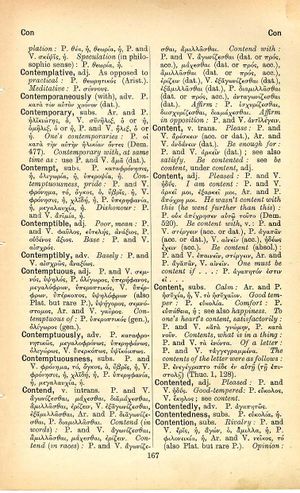contend
ἧς ἂν ἐπ' ἐλάχιστον ἀρετῆς πέρι ἢ ψόγου ἐν τοῖς ἄρσεσι κλέος ᾖ → of whom there is least talk either for praise or blame, of whom there is least notoriety among the men either for praise or blame
English > Greek (Woodhouse)
v. intrans.
P. and V. ἀγωνίζεσθαι, μάχεσθαι, διαμάχεσθαι, ἁμιλλᾶσθαι, ἐρίζειν, V. ἐξαγωνίζεσθαι, ἐξαμιλλᾶσθαι, Ar. and P. διαγωνίζεσθαι, P. διαμιλλᾶσθαι.
Contend (in words): P. and V. ἀγωνίζεσθαι, ἁμιλλᾶσθαι, μάχεσθαι, ἐρίζειν.
Contend (in races): P. and V. ἀγωνίζεσθαι, ἁμιλλᾶσθαι.
Contend with: P. and V. ἀγωνίζεσθαι (dat. or πρός, acc.), μάχεσθαι (dat. or πρός, acc.), ἁμιλλᾶσθαι (dat. or πρός, acc.), ἐρίζειν (dat.), V. ἐξαγωνίζεσθαι (dat.), ἐξαμιλλᾶσθαι (dat.), P. διαμιλλᾶσθαι (dat. or πρός, acc.), ἀνταγωνίζεσθαι (dat.).
Affirm: P. ἰσχυρίζεσθαι, διισχυρίζεσθαι, διαμάχεσθαι.
Affirm in opposition: P. and V. ἀντιλέγειν.

